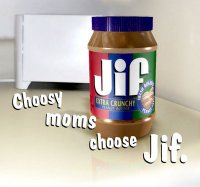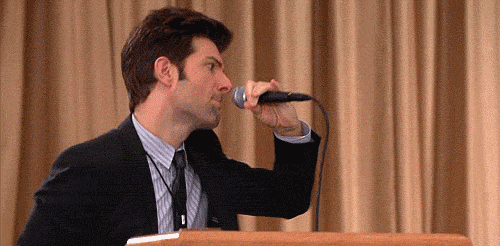While my often controversial word pronunciations have been compiled and catalogued (see my first-ever blog post), there is one in particular on which I have been rather reticent. A certain acronym that many of us Internet-dwellers encounter daily. A certain image format…
In case you forgot to read the title of this post, I refer to the GIF.
Let’s just get this out of the way now — I say it with a hard G. And I know I’m correct. But here’s the cool part — people who say it with a soft G (i.e., the /j/ sound) are also correct! Crazy, I know. I will spend the remainder of this post explaining how I arrived at such an outrageous and outlandish conclusion.
Before I begin advocating for the “JIF” pronunciation, I should define a couple words so that everyone is on the same page.
Initialism — series of initials intended to be pronounced letter by letter, such as F.B.I. (Federal Bureau of Investigation) or CPU (central processing unit)
Acronym — series of initials intended to be pronounced like a word, such as NASA or WASP (white Anglo-Saxon Protestant)
Acronyms like GIF are subject to the same rules that govern English pronunciation of any other word. GIF does not get special treatment just because it is a series of initials in the same way laser and radar, both technically acronyms as well, do not.
Good, now let us proceed.
The .gif file format was introduced to the world in June 1987 by Steve Wilhite while he was working at CompuServe. As the engineering lead of the team that invented it, by all rights he was the one to name it. Wilhite called his creation, of course, the GIF (“graphics interchange format”), and its intended pronunciation with a soft G was implied in the tagline, “Choosy developers choose GIF,” a deliberate nod to the familiar slogan of Jif peanut butter.
he was the one to name it. Wilhite called his creation, of course, the GIF (“graphics interchange format”), and its intended pronunciation with a soft G was implied in the tagline, “Choosy developers choose GIF,” a deliberate nod to the familiar slogan of Jif peanut butter.
GHIF-sayers, take heed: If you pronounce GIF with a hard G because you believe that saying “JIF” can mean only the peanut butter brand, then you are delegitimising your case — and ignoring a brilliant, geeky pun.
The GIF is Steve Wilhite’s baby. He named it, and rightly so. And it doesn’t matter that he’s not a linguist or an English professor; I mean, if YOU were to coin a new word or phrase — or your own child — then surely you wouldn’t want people mispronouncing it. I know *I* wouldn’t. And there’s absolutely nothing wrong with that sentiment.
(Unless, of course, your desired pronunciation is utterly unreasonable, senseless and illogical and does not follow the conventions of English phonetics. Mr. Wilhite’s “JIF” pronunciation perfectly acceptable.)
Nevertheless, as time went on, more and more English speakers began saying it with an assumed hard G pronunciation. When this “improper” pronunciation was met with disdain from those who knew better, those in the “GHIF” camp responded by pointing out that the graphics in GIF begins with a hard G, and therefore the acronym should likewise be pronounced with a hard G.
The “ghiffers” remained steadfast in the face of the thorough, well-articulated case from the other side:
“B-b-but the creator pronounces it ‘JIF!’”
The JIF-sayers had to do better.
The counter-counter-argument from the “jiffers” was that if all acronyms followed that rule, then we would pronounce JPEG “JAY-feg” instead of “JAY-peg,” as the P stands for photographic — or the organisation CARE (Citizens Association for Racial Equality) with a soft C. They reason that acronymic pronunciation is dependent not on the words within it, but rather on what is most phonetically comfortable.
…Which is precisely the point. Those who pronounce GIF with a hard G do so because it is the more phonetically comfortable or logical to them. And the same principle applies to those who pronounce it with a soft G.
And this is where I start to wax linguistic. This pronunciation dichotomy is reflective of a very tangible rift in the DNA of English phonology. English, as a language, can be viewed as a hybrid of Common Germanic and Latin, or more specifically, French — or even more specifically, Norman French. (English is undoubtedly Germanic, yes, but, for the purposes of this post, I am calling it a hybrid.) These two parent branches, to put it simply, had different takes on the consonant G. English would spend the next millennium or so trying to figure out how to pronounce this curious letter following its confused childhood. Does it take after its Germanic mother and use a guttural hard G? Or does it employ a gentler, fronted soft G preferred by its French stepfather?
Language personification aside, the choice comes down, in reality, to its speakers. When we read, we see not individual letters, but letter combinations. For me (and most, if not all GHIF-sayers, I would imagine), when I see “gi-,” I think of words such as give, gift, girl, gill, gild, giggle, gizzard, gimmick, giddy, the prefix giga- and the surname Gilbert. Those who say “JIF” (including creator Steve Wilhite) might model their pronunciation after words such as gin, gist, giraffe and ginger.
It is no surprise, then, that, of all the hard G words I listed, over half of them assuredly are of Germanic origin (gizzard comes from French, giga- is Greek, giggle is imitative and girl and gimmick are of uncertain origin). Conversely, three out of the four soft G words I provided entered English via French, while gin (distilled alcohol) is a shortening of geneva, which does come from French as well, but via Dutch.
Whilst hopelessly wading through a cesspool of a website run by JIF-zealots that was dedicated to the “proper” pronunciation of their sacred word, I encountered a beacon of sound thought. One Erik J. Macki, a like-minded fellow who is evidently well-acquainted with linguistic fundamentals and principles, had posted a comment on the webpage and gave a convincing defence of the hard G pronunciation:
Thank you, Erik. May your efforts not go unrecognised in the edification of my blog readers.
Therefore, linguistically speaking, using a hard G before the vowel I is as viable and historically supported in English as using a soft G, if not more so.
Look. I get it. “JIF” was the original intended pronunciation. I respect that. But if years of devotion to the study of linguistics have taught me anything, it is to respect language evolution — even when I don’t like it. Word spellings, meanings and pronunciations change. People who say “GHIF” are not wrong or improper; they are merely allowing this natural change to occur. If I can live with people pronouncing sherbet as “sherbert,” then Steve Wilhite can live with people saying “GHIF.”
Bottom line? JIF-sayers: stop shaming us for pronouncing GIF with a hard G. GHIF-sayers: stop being dicks to the JIF-sayers.



An excellent argument! The best compromise is the one in which everybody wins. I think I’ll redirect others here the next time this debate comes up in conversation.
LikeLike
Thanks, Amanda! I think I did justice to both sides of the argument despite my bias. It’s really cool that you find my post worthy of reference!
LikeLike